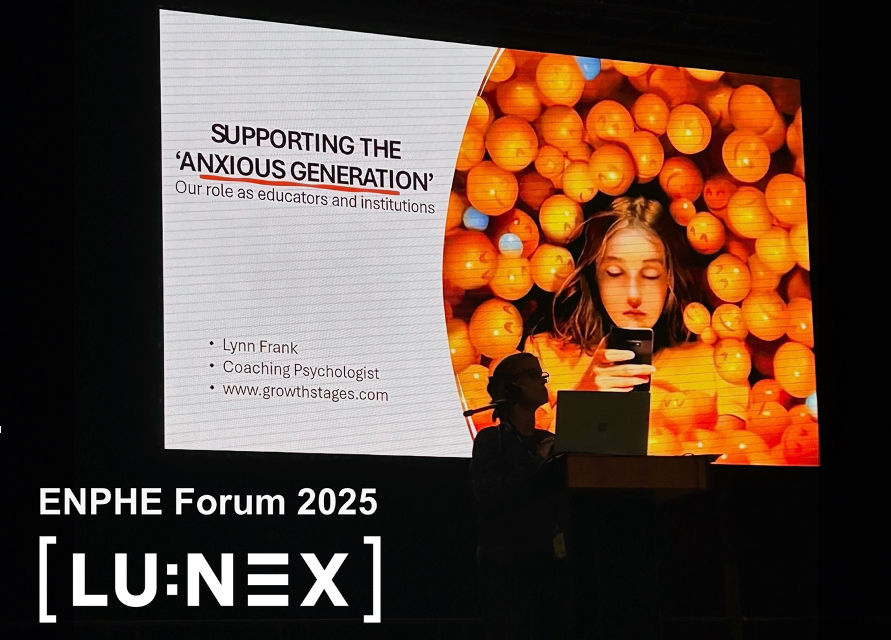At the ENPHE Forum 2025, hosted by Lunex University, coaching psychologist Lynn Frank delivered a keynote on a topic that resonates deeply with educators, health professionals, and institutions across Europe: how to support today’s “anxious generation” of students.
The talk explored the challenges facing Gen Z students—those born from the mid-1990s through the early 2010s—and how universities, educators, and clinical mentors can adapt to help them not just survive, but thrive. This article is a AI generated summary of her speech based on her slides and speaking notes.
The Imaginary Audience in a Digital World
Lynn began by revisiting a concept from developmental psychology: the “imaginary audience”. Traditionally, this describes how young people believe they are constantly being observed and judged, heightening self-consciousness and conformity.
Today, that audience isn’t just imaginary—it’s real, vast, and ever-present through social media. Likes, comments, and constant connectivity magnify scrutiny, fueling anxiety and comparison. For students, this digital spotlight can shape identity, self-worth, and even professional development.
Who Are the Anxious Generation?
The “anxious generation” label reflects rising reports of mental health challenges—particularly anxiety and depression—among Gen Z students. Several contributing factors stand out:
- Social media pressures: comparison, cyberbullying, FOMO, and constant visibility.
- Academic and economic uncertainty: student debt, volatile job markets, and rising expectations.
- Protective upbringings: overscheduling, perfectionism, and reduced opportunities to take risks.
- Global crises: climate anxiety, political instability, and a world defined by volatility and uncertainty.
- Disrupted social development: especially during the COVID era, which left many students struggling with interpersonal skills.
- Stigma around failure: despite progress in mental health awareness, vulnerability often remains hidden.
The result? Students arrive at university with strengths, but also unique challenges that educators must acknowledge.
What Higher Education Institutions Are Seeing
Across Europe, the US, and UK, institutions report similar trends in today’s students:
- Struggles with independent study and long attention spans.
- Difficulty coping with stress in tests and professional settings.
- Higher incidence of anxiety and depression.
- Limited real-world experience and underdeveloped communication skills.
- A perceived lack of maturity compared to past cohorts.
Lynn stressed, however, that anxiety does not equal immaturity. Instead of deficit-based thinking, we should recognise this generation’s strengths.
Beyond Labels: Strengths to Build On
Gen Z students bring significant assets to education and the workplace:
- Openness: ready to talk about mental health and wellbeing.
- Digital fluency: as digital natives, they bring innovative ways of learning and working.
- Autonomy-seeking: they want independence, but also guidance in developing skills like reflection and problem solving.
- Feedback-focused: they thrive on regular, constructive feedback loops.
- Relationship-oriented: they seek meaningful personal and professional connections.
When institutions focus on these strengths, students are more likely to engage and grow.
Normalising Self-Care
One of Lynn’s strongest messages was that self-care is not optional. It should be integrated into the student journey from the start.
Practical approaches include:
- Talking openly about mental health and wellbeing.
- Making support services accessible and affordable.
- Offering preventative workshops on anxiety, procrastination, and perfectionism.
- Building resilience and communication skills into both curriculum and extracurricular activities.
She also invited the audience to reflect on self-care in the workplace, especially during placements. Key elements—sleep, nutrition, exercise, social connection, and rest—are essential to sustain empathy, prevent burnout, and ensure long-term professional growth.
Reimagining the Educational Setting
To better serve this generation, Lynn suggested a fundamental rethinking of how higher education is structured:
- Competency-based frameworks: emphasising not just academic knowledge but lifelong personal and professional growth.
- Psychological safety: creating inclusive spaces where students can ask questions without fear of judgement.
- Designed for digital natives: integrating interactive, tech-based and flipped-learning approaches.
- Constructive feedback loops: building them into teaching, mentoring, and even patient interactions.
- Early development of interpersonal skills: from role play and triads to early clinical experiences.
Promoting Digital Wellness
Since technology is both a lifeline and a stressor, universities need to model and encourage healthier digital habits. This could include:
- Clear boundaries and professional policies around tech use.
- Screen-free zones or campus hours.
- Workshops on digital detox, managing FOMO, and healthy online engagement.
- Peer-led initiatives that reward students for shaping community-based wellness activities.
Rethinking Pressure
Academic and workplace pressures are not going away—but they can be reframed. Encouraging a growth mindset, embracing vulnerability, and redefining success beyond grades or perfect performance helps students build resilience.
Fostering Meaningful Connections
Finally, Lynn emphasised the importance of belonging and connection. This can be nurtured through:
- Peer mentorship and buddy systems.
- Tutor groups and small discussion circles.
- Prioritising in-person events that strengthen community.
- Intergenerational mentoring and alumni engagement.
- Outreach that connects students with the broader community.
Supporting the Next Generation of Physiotherapists
In her closing remarks, Lynn reminded the audience of their responsibility as educators and institutions:
- Recognise the mental health challenges students face.
- Encourage holistic approaches that integrate skills, values, and lifelong growth.
- Engage students as digital natives, harnessing feedback, digital wellness, and leadership opportunities.
- Create opportunities for meaningful connection, fostering belonging between students, educators, and institutions.
The anxious generation is not defined by weakness, but by the potential to reshape education, healthcare, and society—if we meet them with empathy, structure, and support.
Final Thought
Supporting students in this anxious age requires courage and creativity from institutions. By rethinking our frameworks, modelling wellbeing, and nurturing community, we can equip the next generation not only to succeed academically, but to thrive as resilient, compassionate professionals.
If you are working with young people as a parent or educator, and you need help dealing with this generation, then contact Lynn through this CONTACT US link to explore professional coaching opportunities.








